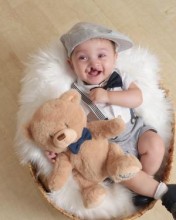931-940 of 4101 Results Found
Condition
Lactose Intolerance in Children What is lactose intolerance in children? Lactose intolerance is when the body can’t easily break down or digest lactose. Lactose is a sugar found in milk and milk products. If your child is lactose intolerant, your child may have unpleasant
Service,
Specialty
Children and teens are not simply little adults: they are growing and changing. Young athletes require specialized care from providers who understand how their bones, joints and muscles develop. They also need providers who understand non-musculoskeletal aspects of sports
Service
Cerebrovascular disorders in children encompass a range of conditions that affect the blood vessels in the brain, leading to issues such as strokes, aneurysms and arteriovenous malformations (AVMs). The risk of stroke is highest during the first year of life, but it can occur at
Service
Suicide Awareness and Prevention At Phoenix Children’s, we believe suicide prevention is a job for all of us. We want to partner with you so you can recognize and step in to help if a child or teen is struggling. The resources here will show you and …
Condition
Kyphosis in Children What is kyphosis in children? Kyphosis is a deformity of the backbone (spine). It’s when the bones of the spine (vertebrae) in the upper back curve outward more than they should. A child with kyphosis has a back that is abnormally rounded or humpback. The
Condition
Aplastic Anemia in Children What is aplastic anemia in children? Aplastic anemia is a serious condition in which the bone marrow doesn’t make enough new blood cells. With fewer blood cells, a child with aplastic anemia has: Less oxygen sent to organs, tissues, and cells from too
Service
At Phoenix Children’s, we do more than just treat patients — we celebrate them. Our Survivor Clinic enjoys long-term relationships with patients as we guide them through the rest of their lives. Our program encompasses clinical care, research and social support. We bring a health
Service
Tics and Tourette syndrome are neurological disorders characterized by sudden, repetitive, involuntary movements or sounds. Tics can range from simple motor actions, such as blinking or head jerking, to complex movements or vocalizations. Tourette syndrome, a more specific form
Condition
Understanding Your Child's Lymphatic System What is the lymphatic system? The lymphatic system is a part of the body’s immune system. It works to fight disease and infection. The lymphatic system goes through many changes during a child's growth. Before birth, a baby is protected
Article
A cleft lip and palate can’t hold back Dylan
A cleft lip and palate can’t hold back Dylan Patient Stories Cleft Lip and Cleft Palate Two-year-old Dylan has kept his parents busy, and smiling, since day one. When he was born, he immediately had the whole room laughing as he stuck his booty straight …

